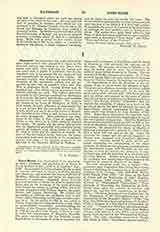

Illuminati (ALUMBRADOS), the name assumed by some false mystics who appeared in Spain in the sixteenth century and claimed to have direct intercourse with God. They held that the human soul can reach such a degree of perfection that it contemplates even in the present life the essence of God and comprehends the mystery of the Trinity. All external worship, they declared, is superfluous, the reception of the sacraments useless, and sin impossible in this state of complete union with Him Who is Perfection Itself. Carnal desires may be indulged and other sinful actions committed freely without staining the soul. The highest perfection attainable by the Christian consists in the elimination of all activity, the loss of individuality, and complete absorption in God (see Quietism). The peasant girl known as La Beata de Piedrahita (d. 1511) is cited among the early adherents of these errors; but it is not certain that she was guilty of heresy. At Toledo, which was one of the main centers of Illuminism, Isabella of the Cross is said to have carried on an active propaganda. More celebrated was Magdalen of the Cross, a Poor Clare of Aguilar near Cordova, who, however, in 1546, solemnly abjured the heresy. So rapidly did the errors gain ground that the Inquisition proceeded with relentless energy against all suspects, even citing before its tribunal St. John of Avila and St. Ignatius of Loyola. In spite of this determined action, however, the heresy maintained itself until the middle of the seventeenth century and some of its features reappear in the Quietism of the Spaniard Michael de Molinos.
N. A. WEBER

